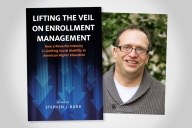You have /5 articles left.
Sign up for a free account or log in.

Governor Tom Wolf, left, has toured his state’s public institutions, including Millersville University, led by President Daniel Wubah. Wolf’s college scholarship program will be up for debate in the Legislature in June.
Commonwealth Media Services
Pennsylvania governor Tom Wolf and his fellow Democrats in the General Assembly are pushing hard for $200 million in funding for scholarships for students enrolled at community colleges and four-year institutions that are part of the state higher education system. Wolf made the same budget request in the previous two years, and it was rejected both times by the Republican-controlled Legislature. But a notable change in the source of the funding, and the support he’s gained in both chambers of the state Legislature, may reverse the trend.
The primary reason for the opposition to the request remains the same—a significant portion of the $200 million would come from the state’s Race Horse Development Trust, which is funded by casino revenues and supports the racing industry. The current scholarship proposal includes $88 million from the trust; the rest would come from federal COVID-19 relief funds, according to a spokesperson for the governor. Past budget requests have proposed that nearly all of the funding come from the horse-racing fund, angering horse-racing industry advocates and their supporters in the Legislature.
The budget fight is expected to accelerate in June as the legislative session comes to a close at the end of the month.
Supporters of the scholarship proposal have been making their case on multiple fronts since the beginning of the year. The latest pitches came earlier this week during hearings in the state House of Representatives and the Senate and were made by Daniel Greenstein, chancellor of the Pennsylvania State System of Higher Education (PASSHE), which oversees the 14 public four-year colleges in the state.
“We’re really trying to get to a point where students and families earning under a certain level can basically attend for free,” Greenstein told lawmakers Tuesday.
The proposal is nicknamed the Nellie Bly Program, in honor of the famous early-20th-century investigative journalist who grew up in Pennsylvania—and who had to drop out of what later became Indiana University of Pennsylvania because she couldn’t afford to continue studying. The program would make scholarships available for students from households with incomes of less than $104,800 who pledge to stay and work in the state after graduation. Supporters say the support would keep more college graduates in the state to fill the increasing number of state jobs in health care, education, public service and other fields now going unfilled because of a lack of qualified candidates.
Greenstein pointed out that under the proposed plan, each potential recipient would receive an average of $5,400—which, he said, “doesn’t wipe out their entire family contribution and unmet need, but it wipes out half.” However, he noted that because the money would be divided among students with the most financial need and the ones entering the occupations with the greatest need, it would go a long way toward solving both problems.
Annual tuition at state four-year institutions is $7,716, and system officials announced earlier this month that it would remain the same for the 2022–23 academic year, making it the fourth straight year without a tuition increase. Total enrollment at the 14 universities this academic year is approximately 89,000.
The Association of Pennsylvania State College and University Faculties threw its support behind Wolf’s entire education budget proposal, including the scholarship plan, earlier this year. Association president Jamie Martin said in February that the scholarship funds would “move the State System back toward its original mission of providing a high-quality education at the lowest possible cost to the students. Public higher education is supposed to be affordable. Not fulfilling this promise has devastating effects on our Commonwealth.”
Meanwhile, Wolf has been touring state universities and community colleges to promote his scholarship proposal.
“Pennsylvanians are being priced out of a brighter future,” he said at Millersville University earlier this month. “When our brightest and best Pennsylvanians can’t pursue a higher education because it’s unaffordable, that means we’re doing something wrong.”
“The past few years have financially challenged our students and their families, and we have responded by taking actions to control costs,” Millersville president Daniel Wubah said during Wolf’s appearance. Wolf’s proposal, he added, “will help meet our commitment to providing students an exceptional and affordable education.”
Wolf also campaigned for the scholarship program at community colleges and at the offices of the Pennsylvania State System of Higher Education (PASSHE) at the Dixon University Center in Harrisburg, the state capital. John Sygielski, president of HACC, Central Pennsylvania’s Community College, last week also touted the benefits of the program: “Giving students access to a HACC education, for example, and/or one of the 14 PASSHE institutions, could change the trajectory of the lives of thousands of economically disadvantaged postsecondary students in Pennsylvania.” (Note: This paragraph was updated to correct the location where Gov. Wolf spoke.)
Also, by eliminating the need for student loans, he said, “it could relieve the added burden of debt that is a detriment to many who dream of a better future for their families and themselves.”
Democratic state assemblyman Jordan Harris, a Millersville alumnus who also spoke at the university’s event, introduced a bill in early April that essentially repeated Wolf’s budget request for the scholarships.
“It creates another pathway, and it gets people interested, understanding why we have these needs for this scholarship fund,” Harris said.
The federal stimulus money and a nearly $2.9 billion surplus in the state budget at the end of the last fiscal year, according to the budget Wolf submitted, make Harris believe that the scholarship bill is too good to pass up again.
“The big question people had in the past is, how do you pay for it? I submit to you that Pennsylvania is in a totally different situation today than it was in those years,” he said.
That was the problem horse-racing industry officials continued to bring up in explaining their opposition to the scholarship fund. The proposals in 2020 and 2021 called for nearly 100 percent of the funding to come from the Race Horse Development Trust.
When Wolf included the scholarship proposal in the budget in February, Republican state senator Stan Saylor called the proposal “dead on arrival,” according to PennLive.com.
That same month, Thomas Ellis, chairman of the Pennsylvania Horse Racing Commission (a division of the state Department of Agriculture), told the gaming website PennBets.com that he and his organization are just as opposed to the program as they were the previous two years, regardless of the change in funding.
“This is kind of like Groundhog Day,” Ellis said, adding, “Robbing Peter to pay Paul will not solve the problem … We appreciate the governor’s efforts to address student debt, but we truly feel this is the wrong way to go.”
The Pennsylvania Horsemen’s Benevolent and Protective Association estimates that the state horse industry generates $1.6 billion in annual revenue. State casino revenue has steered some $3 billion into the horse trust since 2004.
The federal money that would reduce the burden on the horse-racing industry is an important departure from the past, the governor’s spokesperson said, noting that the program “would not affect the Trust Fund’s funds for regulatory work and promotion, but it would help make college more affordable, minimize reliance on student loans, strengthen pipelines to high demand careers, and keep talented students in Pennsylvania. While the racing industry is important to Pennsylvania, it is time for the industry to support itself and continue to build upon the unprecedented generous economic investment made by the commonwealth to this single industry.”
However, racing industry officials argue that they could be left on the hook again for the program once the federal money—which makes up more than half of the proposed $200 million—is gone. Supporters of the funding plan point out that the bill has guarantees that protect the trust in future years, including a possible cap on the amount that will come from the trust.
The next two months will determine which side—both of which are deeply dug in—will prevail, said Democratic state senator Wayne Fontana. He previously introduced companion bills in the Senate to support the scholarship proposal—even before the severe economic impact of the pandemic and mounting student debt became a national issue. He also submitted a memo of support for the bill Harris introduced in the Assembly.
Fontana said the inclusion of the federal stimulus funds makes the prospects of the bill passing more likely.
“I think it has a better chance for a more meaningful path forward,” he said, adding, however, “We need the public to weigh in on this.”
A poll of registered Pennsylvania voters conducted in June 2021 by Franklin & Marshall College said 82 percent would either somewhat favor or strongly favor using horse trust money for a state college scholarship fund. The same poll said that 83 percent would prefer using money from the trust “for other purposes” besides the horse industry.
“If the public says, ‘We want that money to go to education and not to the horses,’ that would really give it some sting,” Fontana said.








